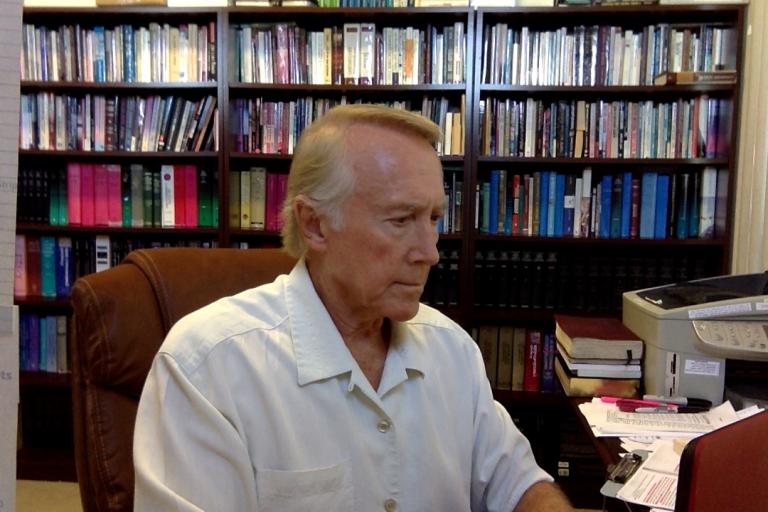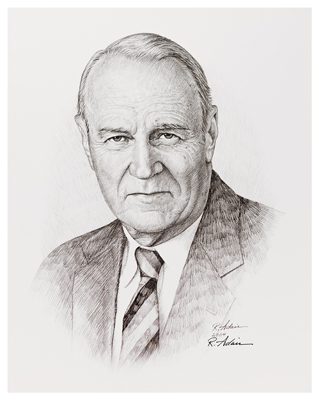My First Christological Discussion with Dr. S. Lewis Johnson—Section A
 By now, in the mid-1980s, Dr. S. Lewis Johnson was still living in Dallas while commuting back and forth to Chicago to teach two days per week at Trinity Evangelical Divinity School (TEDS). I phoned Lewis and requested to come and see him to discuss “something important in theology.” I didn’t tell him specifically what it was about. He welcomed me, as he had on other occasions. We met alone one day in October, 1986.
By now, in the mid-1980s, Dr. S. Lewis Johnson was still living in Dallas while commuting back and forth to Chicago to teach two days per week at Trinity Evangelical Divinity School (TEDS). I phoned Lewis and requested to come and see him to discuss “something important in theology.” I didn’t tell him specifically what it was about. He welcomed me, as he had on other occasions. We met alone one day in October, 1986.
 Lewis and I met together in his house and discussed Christology for six hours that first day. Sometimes, I worry that I wear people out with my questions, since I have so many. What now follows is almost verbatim from my notes that I wrote during and right after we met. It was surely the most important theological conversation I had ever had with anyone up to that time in my life. I had just turned 45 years of age, and I think Lewis was 70.
Lewis and I met together in his house and discussed Christology for six hours that first day. Sometimes, I worry that I wear people out with my questions, since I have so many. What now follows is almost verbatim from my notes that I wrote during and right after we met. It was surely the most important theological conversation I had ever had with anyone up to that time in my life. I had just turned 45 years of age, and I think Lewis was 70.
I first asked Dr. Johnson, “What is necessary to believe about Jesus Christ in order to be saved?” What I always mean by this, and often explain at length, is this: What must a person believe about Jesus, once that person learns about it, to become a genuine Christian. This was Lewis’ twofold answer: (1) Jesus is the Son of God, a divine being with both a divine nature and a human nature; (2) Lewis then spoke at length about soteriology—what we must believe about the work of Christ for salvation. (Throughout much of Lewis’ career, he was known for specializing in soteriology.) He spoke of Jesus’ substitutionary death as an atonement for our sins. I then realized that I may not have made my question clear. I wanted to know what we must believe about Jesus’ person in order to be saved. I have always believed strongly in Jesus’ substitutionary atonement. But Lewis’ may have thought you can’t separate the two concepts.
Then I shared my new thinking on Christology. It was that God, the Father, is greater in essence than Jesus, so that Jesus is fully subordinate to God. I told Lewis that the three main NT texts that I thought supported what I was saying were, first of all, (1) Jesus calling the Father “the only true God” (John 17.3), (2) what the Apostle Paul says in 1 Cor. 8.6 (“there is one God, the Father”), and (3) Eph. 4.6 (“one God and Father of all”). I don’t recall his response.
We then discussed some of the primary biblical texts cited by Trinitarian scholars for their position, such as John 1.1c; 10.28; Romans 9.5; 2 Thes. 1.12; Titus 2.13; 2 Peter 1.1; 1 Jn 5.20; Heb. 1.8; and Phil. 2.6-11. At that time, John 1.1c and 20.28 were still problematic for me. [I learned later that Dr. Johnson was the supervisor for Dickinson’s PhD dissertation on John 1.1c—in which he sides with Philip Harner and the New English Bible in saying its anarthrous theos does not indicate Jesus as the logos is God—and Lewis graded Dickinson’s work with an A-.]
I was not shocked when Lewis replied to me, “You believe in a demigod. That’s Unitarian. You can’t believe that. Either you must believe in the Trinity, that Jesus Christ is God, or you will believe in,” and here I forgot what he said.
He again said, “You can’t believe that.” He argued strenuously that what I was saying, generally, was “illogical.” I was still saying Jesus was divine, but not to the extent that God, who is the Father, is divine. So, up to that time, I was somewhat Arian in belief. But it was mostly because I had no alternative answer for the standard translation of John 1.1c and interpretation of 20.28. Lewis said, “If Christ is a divine being, then He must be God.” I repeatedly acknowledged my belief that Jesus is a divine being.
Lewis replied, “Then you believe in two gods.” I admit it did look that way. However, I now thought Trinitarianism looked like the worship of three Gods/gods, though I didn’t say it. I then tried to explain myself again and he responded, “Then you believe in a demigod.”
Of all of Lewis’ statements to me that day, he was most adamant in saying, “You must believe in the doctrine of the Trinity to be saved.” He then revealed that he had friends who are Mormons and friends of other religions who say what I was saying. He asserted, “They think they are Christians, but they are not.”
My Christological Journey (Part 6 of 12)
………………………..
To see a list of titles of 130+ posts (2-3 pages) that are about Jesus not being God in the Bible, with a few about God not being a Trinity, at Kermit Zarley Blog click “Chistology” in the header bar. Most are condensations of my book, The Restitution of Jesus Christ. See my website servetustheevangelical.com, which is all about this book, with reviews, etc. Learn about my books and purchase them at kermitzarley.com. My books are: The Gospels Interwoven (1987); Palestine Is Coming: The Revival of Ancient Philistia (1990); The Third Day Bible Code (2006); The Restitution of Jesus Christ (2008); Warrior from Heaven (2009); Solving the Samaritan Riddle: Peter’s Kingdom Keys Explain Early Spirit Baptism (2015).
















